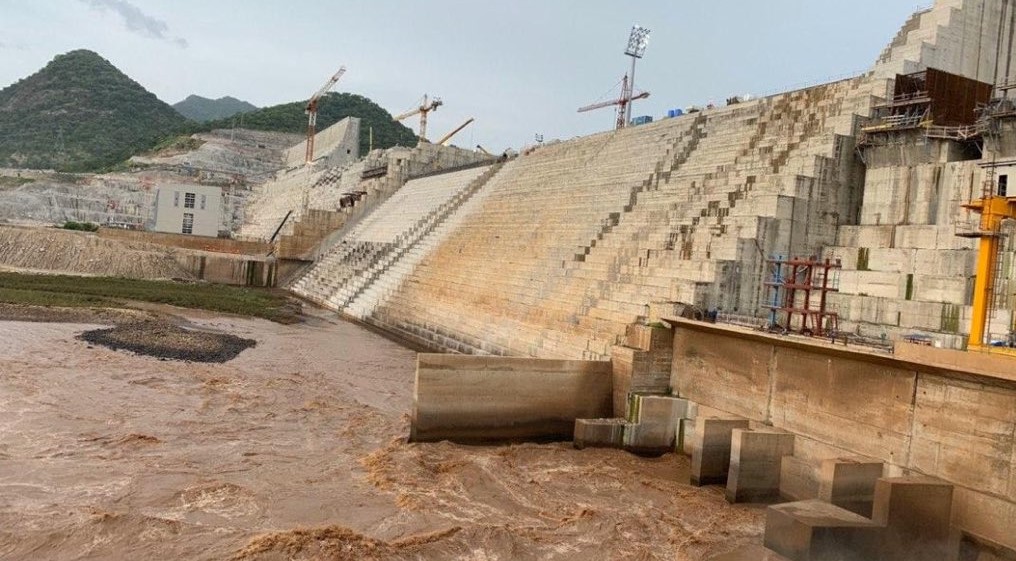A new round of negotiations between Ethiopia, Sudan, and Egypt aimed at resolving a long-running dispute about the Grand Ethiopian Renaissance Dam has once again faltered.
Irrigation ministers of Cairo, Addis Ababa, and Khartoum held a meeting on Sunday chaired by the foreign minister of South Africa, current African Union president, to discuss means of resuming negotiations.
“Sudan insisted on the assigning of AU experts to offer solutions to contentious issues … a proposal which Egypt and Ethiopia have reservations about,” Egypt’s foreign ministry said in a statement posted to social media.
The six-way meeting failed to achieve any progress due to disagreements over means of resuming negotiations, as well as the procedural aspects of managing the negotiation process, the statement explained.
Cairo and Addis Ababa insist on the three countries’ right to draft the texts and provisions of GERD’s filling and operation agreement, the statement noted, adding that the AU experts are not specialists in the technical and engineering fields related to the management of water resources and dam operations.
In its own statement on state news agency SUNA, Sudan said it objected to what it said was a Jan. 8 letter from Ethiopia to the AU stating that Ethiopia was determined to fill the reservoir for the second year in July with 13.5 million cubic meters of water, whether an agreement is reached or not.
“We cannot continue this vicious cycle of circular talks indefinitely,” Sudanese irrigation minister Yasir Abbas said in a statement.
He stressed that Khartoum was concerned the dam could overwhelm its nearby Roseires dam if an agreement is not reached that would allow the countries to share data.
On Saturday, Sudanese officials AU experts team held a meeting over GERD.
The meeting came in response to Sudan’s call for giving AU experts a greater role to facilitate the talks among the three countries to contribute to the preparation of a second document for the proposed memorandum of agreement they earlier received in previous meetings.
Parties thoroughly discussed the importance of setting up a clear reference framework for the role of the AU experts.
Khartoum also stressed the necessity that the AU plays a more effective leadership role than its role in the previous rounds of talks, highlighting the importance of reaching a binding agreement to discuss and end any potential dispute.
Sudan rejects dividing the agreement into first filling and then permanent operation and demands reaching a single, comprehensive agreement that addresses all GERD issues.
South African Foreign Minister Naledi Pandor voiced her “regret that the talks reached a dead end.”
Pandor said she would refer the matter to South African President Cyril Ramaphosa, current chairperson of the African Union, for necessary measures.
The three countries have been engaged in strenuous negotiations for about 10 years to agree on mechanisms for operating and filling the dam, without yielding any results so far.
Egypt has called GERD an existential threat and worries that it will reduce the country’s share of Nile waters.
Ethiopia says the 145-meter tall dam will be an engine of development and is vital to meet the power needs of its population.
Sudan, in the middle, worries about the effects on its own dams, although it stands to benefit from access to cheap electricity.
The Blue Nile, which meets the White Nile in the Sudanese capital, provides the great majority of the combined Nile’s flow through northern Sudan and Egypt to the Mediterranean.








































admin in: How the Muslim Brotherhood betrayed Saudi Arabia?
Great article with insight ...
https://www.viagrapascherfr.com/achat-sildenafil-pfizer-tarif/ in: Cross-region cooperation between anti-terrorism agencies needed
Hello there, just became aware of your blog through Google, and found ...